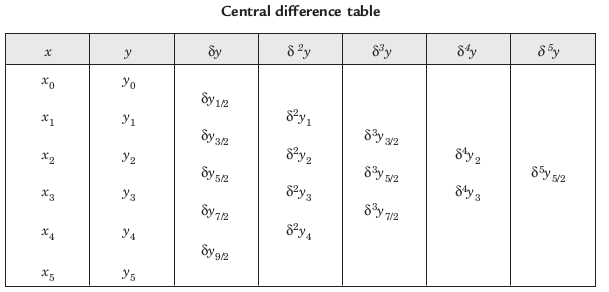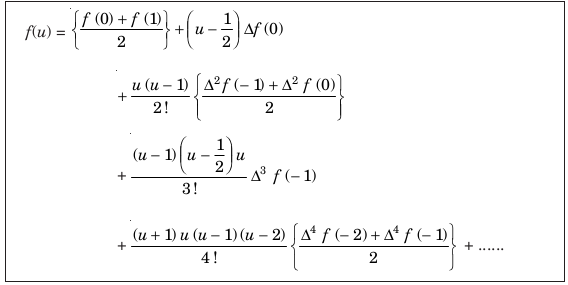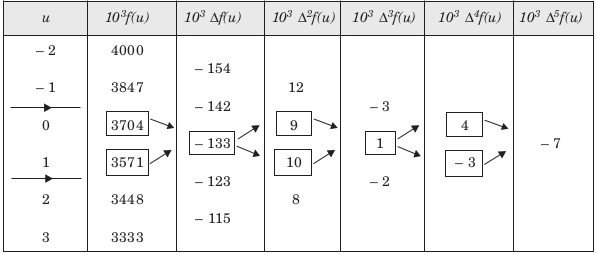插值是一种针对自变量的任何中间值估算函数值的技术,而计算给定范围之外的函数值的过程称为外推。
中心差:中心差运算符d由以下关系定义:
![]()
同样,高阶中心差定义为:
![]()
注–同一条水平线上的中心差具有相同的后缀

贝塞尔的插值公式–

当u = 1/2时,它非常有用。当1/4 时可以给出更好的估计
这里的f(0)是原点,通常取为中点,因为贝塞尔(Bessel’s)用于在中心附近进行插值。
h称为差的间隔,而u =(x – f(0))/ h,其中f(0)是所选原点的项。
例子 –
输入:27.4处的值? 
输出 : 
27.4的值为3.64968
贝塞尔插值的实现–
C++
// CPP Program to interpolate using Bessel's interpolation
#include
using namespace std;
// calculating u mentioned in the formula
float ucal(float u, int n)
{
if (n == 0)
return 1;
float temp = u;
for (int i = 1; i <= n / 2; i++)
temp = temp * (u - i);
for (int i = 1; i < n / 2; i++)
temp = temp * (u + i);
return temp;
}
// calculating factorial of given number n
int fact(int n)
{
int f = 1;
for (int i = 2; i <= n; i++)
f *= i;
return f;
}
int main()
{
// Number of values given
int n = 6;
float x[] = { 25, 26, 27, 28, 29, 30 };
// y[][] is used for difference table
// with y[][0] used for input
float y[n][n];
y[0][0] = 4.000;
y[1][0] = 3.846;
y[2][0] = 3.704;
y[3][0] = 3.571;
y[4][0] = 3.448;
y[5][0] = 3.333;
// Calculating the central difference table
for (int i = 1; i < n; i++)
for (int j = 0; j < n - i; j++)
y[j][i] = y[j + 1][i - 1] - y[j][i - 1];
// Displaying the central difference table
for (int i = 0; i < n; i++) {
for (int j = 0; j < n - i; j++)
cout << setw(4) << y[i][j] << "\t";
cout << endl;
}
// value to interpolate at
float value = 27.4;
// Initializing u and sum
float sum = (y[2][0] + y[3][0]) / 2;
// k is origin thats is f(0)
int k;
if (n % 2) // origin for odd
k = n / 2;
else
k = n / 2 - 1; // origin for even
float u = (value - x[k]) / (x[1] - x[0]);
// Solving using bessel's formula
for (int i = 1; i < n; i++) {
if (i % 2)
sum = sum + ((u - 0.5) *
ucal(u, i - 1) * y[k][i]) / fact(i);
else
sum = sum + (ucal(u, i) *
(y[k][i] + y[--k][i]) / (fact(i) * 2));
}
cout << "Value at " << value << " is " << sum << endl;
return 0;
} Java
// Java Program to interpolate using Bessel's interpolation
import java.text.*;
class GFG{
// calculating u mentioned in the formula
static double ucal(double u, int n)
{
if (n == 0)
return 1;
double temp = u;
for (int i = 1; i <= n / 2; i++)
temp = temp * (u - i);
for (int i = 1; i < n / 2; i++)
temp = temp * (u + i);
return temp;
}
// calculating factorial of given number n
static int fact(int n)
{
int f = 1;
for (int i = 2; i <= n; i++)
f *= i;
return f;
}
public static void main(String[] args)
{
// Number of values given
int n = 6;
double x[] = { 25, 26, 27, 28, 29, 30 };
// y[][] is used for difference table
// with y[][0] used for input
double[][] y=new double[n][n];
y[0][0] = 4.000;
y[1][0] = 3.846;
y[2][0] = 3.704;
y[3][0] = 3.571;
y[4][0] = 3.448;
y[5][0] = 3.333;
// Calculating the central difference table
for (int i = 1; i < n; i++)
for (int j = 0; j < n - i; j++)
y[j][i] = y[j + 1][i - 1] - y[j][i - 1];
// Displaying the central difference table
DecimalFormat df = new DecimalFormat("#.########");
for (int i = 0; i < n; i++) {
for (int j = 0; j < n - i; j++)
System.out.print(y[i][j]+"\t");
System.out.println("");
}
// value to interpolate at
double value = 27.4;
// Initializing u and sum
double sum = (y[2][0] + y[3][0]) / 2;
// k is origin thats is f(0)
int k;
if ((n % 2)>0) // origin for odd
k = n / 2;
else
k = n / 2 - 1; // origin for even
double u = (value - x[k]) / (x[1] - x[0]);
// Solving using bessel's formula
for (int i = 1; i < n; i++) {
if ((i % 2)>0)
sum = sum + ((u - 0.5) *
ucal(u, i - 1) * y[k][i]) / fact(i);
else
sum = sum + (ucal(u, i) *
(y[k][i] + y[--k][i]) / (fact(i) * 2));
}
System.out.printf("Value at "+value+" is %.5f",sum);
}
}
// This code is contributed by mitsPython3
# Python3 Program to interpolate
# using Bessel's interpolation
# calculating u mentioned in the
# formula
def ucal(u, n):
if (n == 0):
return 1;
temp = u;
for i in range(1, int(n / 2 + 1)):
temp = temp * (u - i);
for i in range(1, int(n / 2)):
temp = temp * (u + i);
return temp;
# calculating factorial of
# given number n
def fact(n):
f = 1;
for i in range(2, n + 1):
f *= i;
return f;
# Number of values given
n = 6;
x = [25, 26, 27, 28, 29, 30];
# y[][] is used for difference
# table with y[][0] used for input
y = [[0 for i in range(n)]
for j in range(n)];
y[0][0] = 4.000;
y[1][0] = 3.846;
y[2][0] = 3.704;
y[3][0] = 3.571;
y[4][0] = 3.448;
y[5][0] = 3.333;
# Calculating the central
# difference table
for i in range(1, n):
for j in range(n - i):
y[j][i] = y[j + 1][i - 1] - y[j][i - 1];
# Displaying the central
# difference table
for i in range(n):
for j in range(n - i):
print(y[i][j], "\t", end = " ");
print("");
# value to interpolate at
value = 27.4;
# Initializing u and sum
sum = (y[2][0] + y[3][0]) / 2;
# k is origin thats is f(0)
k = 0;
if ((n % 2) > 0): # origin for odd
k = int(n / 2);
else:
k = int(n / 2 - 1); # origin for even
u = (value - x[k]) / (x[1] - x[0]);
# Solving using bessel's formula
for i in range(1, n):
if (i % 2):
sum = sum + ((u - 0.5) *
ucal(u, i - 1) *
y[k][i]) / fact(i);
else:
sum = sum + (ucal(u, i) * (y[k][i] +
y[k - 1][i]) / (fact(i) * 2));
k -= 1;
print("Value at", value, "is", round(sum, 5));
# This code is contributed by mitsC#
// C# Program to interpolate using Bessel's interpolation
class GFG{
// calculating u mentioned in the formula
static double ucal(double u, int n)
{
if (n == 0)
return 1;
double temp = u;
for (int i = 1; i <= n / 2; i++)
temp = temp * (u - i);
for (int i = 1; i < n / 2; i++)
temp = temp * (u + i);
return temp;
}
// calculating factorial of given number n
static int fact(int n)
{
int f = 1;
for (int i = 2; i <= n; i++)
f *= i;
return f;
}
public static void Main()
{
// Number of values given
int n = 6;
double []x = { 25, 26, 27, 28, 29, 30 };
// y[,] is used for difference table
// with y[,0] used for input
double[,] y=new double[n,n];
y[0,0] = 4.000;
y[1,0] = 3.846;
y[2,0] = 3.704;
y[3,0] = 3.571;
y[4,0] = 3.448;
y[5,0] = 3.333;
// Calculating the central difference table
for (int i = 1; i < n; i++)
for (int j = 0; j < n - i; j++)
y[j,i] = y[j + 1,i - 1] - y[j,i - 1];
// Displaying the central difference table
for (int i = 0; i < n; i++) {
for (int j = 0; j < n - i; j++)
System.Console.Write(y[i,j]+"\t");
System.Console.WriteLine("");
}
// value to interpolate at
double value = 27.4;
// Initializing u and sum
double sum = (y[2,0] + y[3,0]) / 2;
// k is origin thats is f(0)
int k;
if ((n % 2)>0) // origin for odd
k = n / 2;
else
k = n / 2 - 1; // origin for even
double u = (value - x[k]) / (x[1] - x[0]);
// Solving using bessel's formula
for (int i = 1; i < n; i++) {
if ((i % 2)>0)
sum = sum + ((u - 0.5) *
ucal(u, i - 1) * y[k,i]) / fact(i);
else
sum = sum + (ucal(u, i) *
(y[k,i] + y[--k,i]) / (fact(i) * 2));
}
System.Console.WriteLine("Value at "+value+" is "+System.Math.Round(sum,5));
}
}
// This code is contributed by mitsPHP
输出:
4 -0.154 0.0120001 -0.00300002 0.00399971 -0.00699902
3.846 -0.142 0.00900006 0.000999689 -0.00299931
3.704 -0.133 0.00999975 -0.00199962
3.571 -0.123 0.00800014
3.448 -0.115
3.333
Value at 27.4 is 3.64968